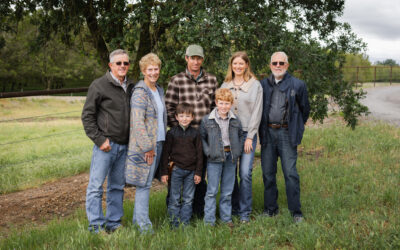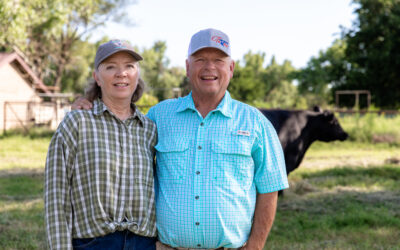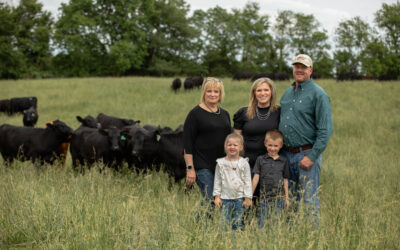
Connections
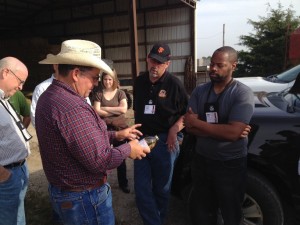
Jay Rezac always knew he wanted to come back to the farm. He told the CAB “Master of Brand Advantages” (MBA) class that by the time he was in high school he was borrowing money to buy herds of stocker cattle. I was not surprised at that, but what he shared next did surprise me.
He looked at me while explaining that he wanted to buy the place coming up for auction in 1980 near where his grandpa had started in the early 1900s. “Nobody would give a 16-year-old kid a loan to buy land though,” he said. “Steve bought that place and it’s probably a good thing for both of us, as I went on to college.”
Jay spoke from the heart, helping the group understand how he started with only a desire to live out his dream. “I didn’t know the farm economy was just about to change in 1980,” he said, jacking interest rates up and crashing land values.
“When I got back from K-State, things had not improved much.” But the timing actually helped: with a brother also recently graduated, the family looked around and found somewhat affordable ranch land that opened the doors for the new generation.
“We said let’s DO it, and we did it,” Jay said, noting the great financial risks. “That first place propelled us into buying the cattle and equipment, we bought another 1600-acre ranch two years later, and we have never looked back. We had our land base.”
He and two siblings all married and each family had three children of similar ages, several of them now starting on their own dream of producing food for the world.
The foodservice group wanted to know how and why the Rezacs use horses.
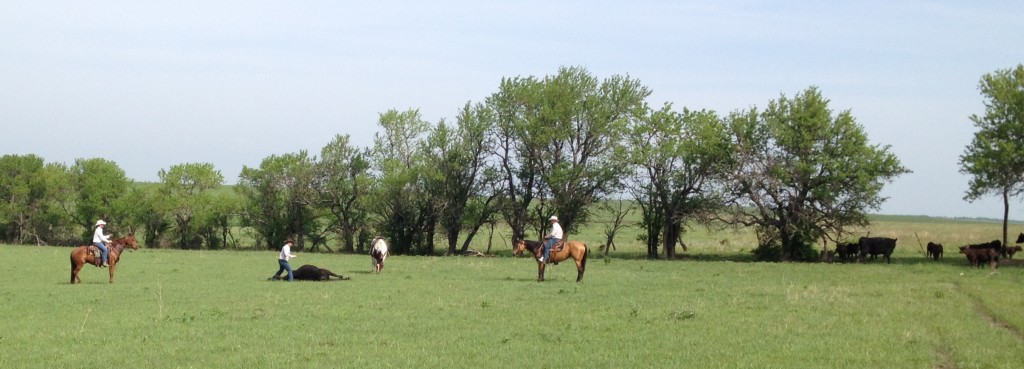
“Some people use a calf chute to brand and work calves, but my guys like to rope and do it that way,” Jay explained. “You just catch his heels, flip him over and it doesn’t take long.” The brand goes on and vaccinations go in to safeguard their health. “We have neighbors come and help us do 300 one day and a party that night—we like to have fun every once in a while.”
The family later demonstrated roping in a calf corral and while moving a herd when one 1,200-pound cow was showing early signs of footrot. That ability on horseback allowed prompt treatment on the spot so that the cow will quickly recover.
Jay explained the sick pen where any animals in need of closer attention comes home for a short stay, and he told the group, “Antibiotics aren’t something you want to use, but sometimes you have to.” Noting a bottle of product can cost $500 or even $1,500, he joked that you only drop one of those, and you inject it only when needed, according to the label.
Weaning brings pairs into the lots where calves stay and the cows go back out to other pastures. Depending on the market, the Rezacs may background or finish steers at a nearby custom feedlot where many of them qualify for the CAB brand.
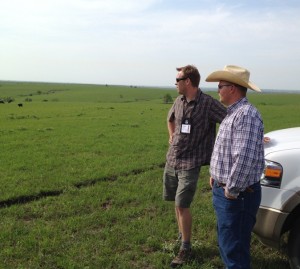
After the last demo on heifer breeding and a quick tour of the ranch feedlot pens, Jay told the group they are all welcome to come back anytime with their families.
“Of course, the day was about education for our beef-selling partners, but for me, it was also quite a bit of fun and eye-opening in other ways. It was great to see the foodservice pros learning about these hills where our neighbors raise great cattle and great kids, and to have us all learn more about our connections.
Till next time, let’s keep building tomorrow together.
–Steve
You may also like
Legacy in the Golden Land
On a quiet stretch of Northern California rangeland, a different story unfolds. The Borror family’s legacy modestly speaks through the cattle they raise, the ground they steward. The generations who’ve made a life here demonstrate commitment to doing things right, even when no one is watching.
Helping Hands, Helping Herds
“When I die, I want to come back as one of your cows,” murmurs a friend to Steve Zybach. Full to the brim from an alfalfa ration every day, bountiful fields of lovegrass stretched out across the Texas Panhandle—and owners who leave no ounce of cattle care up for question. The Zybachs’ motivation for this level of dedication to their Angus cattle is simply love.
An Ambassador for All
Joanie, with daughter Lindsey and her husband, Adam Hall, raise registered Angus cattle with two primary goals: producing high-quality seedstock that perform well in a wide variety of environments and ensuring end-user satisfaction. Those goals tie everything together, from promoting Angus to other producers to sharing their story with CAB partners and beef consumers.

